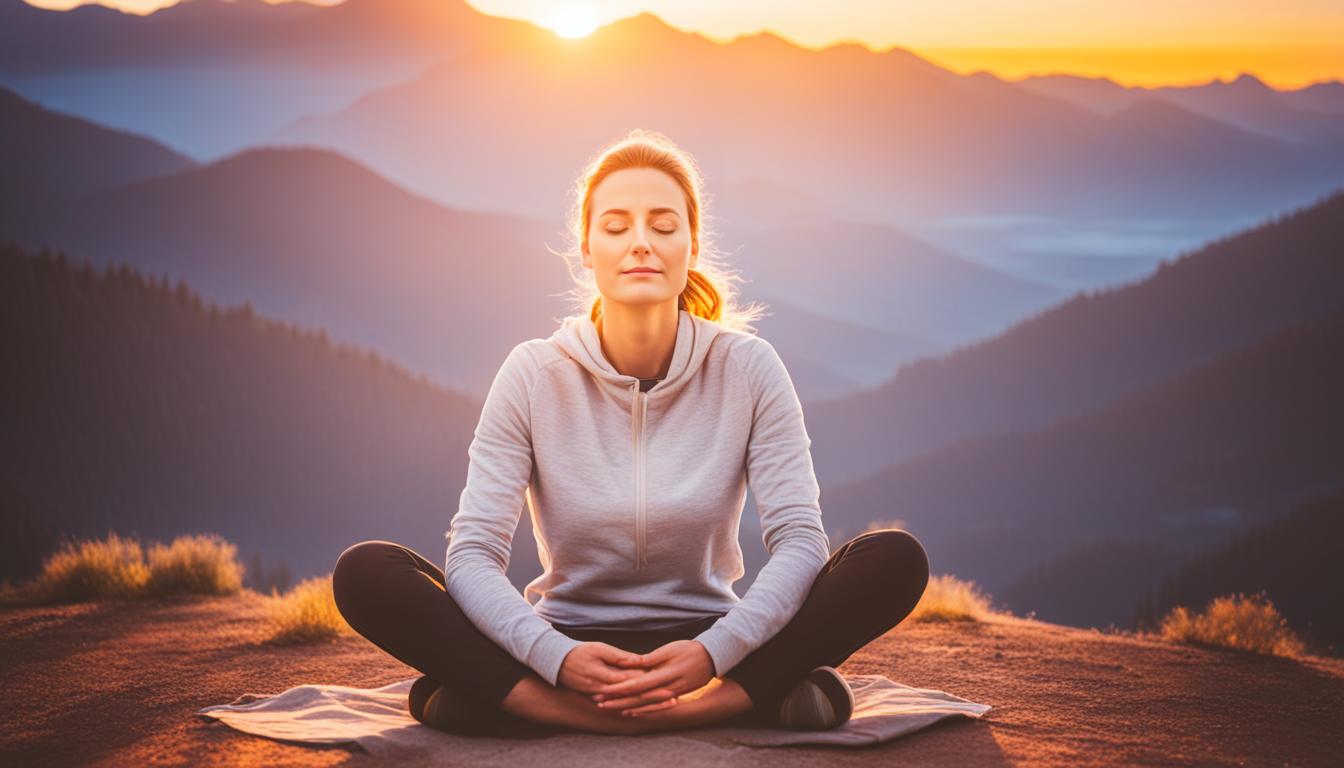Looking for a quick and effective way to find instant calm and refresh your mind? Incorporate this simple 2 minute meditation practice into your daily routine. Meditation is a powerful tool for reducing stress and promoting relaxation, and you can experience its benefits in just a few minutes.
Key Takeaways:
- 2 minute meditation is a short and effective way to reduce stress and find instant calm.
- Practicing mindfulness exercises can improve your mental health and overall well-being.
- Engaging your senses in meditation can enhance your meditation experience.
- Scientific studies have shown that meditation has significant benefits for brain health and relaxation.
- Overcome common challenges with meditation by focusing on the present moment.
The Benefits of 2 Minute Meditation
Research has shown that even just a few minutes of meditation each day can have significant benefits for your mental health and overall well-being. Incorporating 2 minute meditation practices into your daily routine can help you reduce stress, calm your mind, and improve your ability to focus and concentrate.
This short amount of time is all it takes to reset your mind and relax your body. By dedicating just 2 minutes to mindfulness, you can create a sense of balance and inner peace that positively impacts every aspect of your life.

One study conducted at a prestigious university found that a regular mindfulness routine can significantly reduce stress levels. By taking a few moments each day to focus on your breath and be present in the moment, you can release tension and find relief from the pressures of daily life.
Not only does 2 minute meditation provide stress relief, but it also improves your overall mental health. By giving your mind a break from constant thoughts and worries, you create space for clarity and peace. Many individuals report feeling more calm, centered, and grounded after incorporating this practice into their daily routine.
Mindfulness has also been shown to enhance focus and concentration. When you take the time to pause and observe your thoughts without judgment, you train your mind to stay present and focused. This increased mental clarity can improve productivity and efficiency in both work and daily tasks.
By setting aside just 2 minutes each day for meditation, you can create a powerful mindfulness routine that promotes relax and reset. Whether you choose to meditate in the morning before starting your day or in the evening to wind down before bed, this practice can have a profound impact on your mental well-being.
How to Practice 2 Minute Meditation
Practicing 2 minute meditation is simple and can be done anywhere, at any time. Find a quiet and comfortable space where you can sit or lie down. Close your eyes and take a few deep breaths to center yourself. Choose a focus for your meditation, such as your breath, a sound, or a visual image. Allow your mind to gently rest on this focus, and if your mind wanders, gently bring it back. Set a timer for 2 minutes and allow yourself to fully immerse in the present moment.

Using Your Senses in 2 Minute Meditation
One effective technique for 2 minute meditation is to engage your senses. By intentionally focusing on what you see, hear, feel, taste, and smell, you can bring yourself into the present moment and enhance your overall meditation experience.
These sensory meditations, also known as grounding tools or concentration meditations, can help you relax, release anxiety, and retrain your brain to focus on the present. Incorporating these sensory-focused techniques into your meditation practice can make it more enjoyable and effective.
When practicing sensory meditations, start by finding a quiet and comfortable space where you can sit or lie down. Close your eyes and take a few deep breaths to center yourself.
Now, let’s explore some specific techniques to engage each of your senses during meditation:
Sight
Focus on an object or image that brings you a sense of peace or inspires you. Visualize the details, colors, and textures. Allow yourself to fully immerse in the visual experience, bringing your attention back whenever your mind starts to wander.
Hearing
Listen to the sounds around you, whether it’s the chirping of birds, the rustling of leaves, or calming music. Pay attention to the different tones and rhythms. Allow the sounds to wash over you, finding relaxation in the present moment.
Touch
Bring your awareness to the feeling of your body on the ground or on a chair. Feel the weight and contact points. You can also focus on sensations within your body, such as the rise and fall of your breath or the feeling of your hands resting on your knees. Embrace the physical sensations and let them ground you in the present.
Taste
Engage your sense of taste by slowly savoring a small piece of food or a sip of a warm beverage. Notice the flavors, textures, and temperatures. Allow yourself to be fully present in the taste experience, savoring each moment.
Smell
Find a calming scent, such as essential oils or fresh flowers. Take a deep breath in, focusing on the aroma as it fills your lungs. Allow the scent to transport you to a peaceful state of mind.
Remember, these sensory meditations are not limited to one sense at a time. You can combine them or focus on one sense that resonates with you the most. Experiment with different techniques to find what works best for you.

The Science Behind 2 Minute Meditation
Numerous scientific studies have explored the effects of meditation on brain health and overall well-being. Researchers from Harvard have discovered that mindfulness meditation can increase cortical thickness in the brain’s hippocampus, which is responsible for learning, memory, and emotion regulation. The plumper gray matter volume throughout the brain, as revealed by UCLA research, promotes calmness and focus. Moreover, meditation has been found to have similar effects as antidepressants in improving symptoms of mild to moderate depression. These findings attest to the powerful impact that 2 minute meditation can have on brain health and promoting relaxation response.
By incorporating just a few minutes of meditation into your daily routine, you can support your brain’s health and enhance your overall well-being. The benefits of 2 minute meditation extend beyond relaxation and stress reduction. It has the potential to improve memory, concentration, and emotional regulation, contributing to a holistic approach to brain health and mental well-being. The relaxation response triggered by this technique allows your brain to recharge and function optimally, benefiting various aspects of your life.

Medical Experts on the Benefits of Meditation
“The research on the effects of meditation is incredibly promising. Not only does it promote relaxation and calm, but it also has tangible effects on the brain. Engaging in regular 2 minute meditation practices can lead to improved brain health, enhanced focus, and greater emotional well-being. It’s a simple yet powerful tool that everyone can incorporate into their daily routine.” – Dr. Emily Anderson, Neurologist
Medical professionals recommend making meditation a regular practice to support brain health and overall well-being. Just a few minutes of mindful meditation each day can make a significant difference in your cognitive function, emotional well-being, and overall mental health.
Overcoming Common Challenges with 2 Minute Meditation
Many people find meditation challenging because they feel boredom, restlessness, or have difficulty concentrating. However, the sensory-focused nature of 2 minute meditation can help overcome these common challenges.
By engaging your senses and shifting your focus to the present moment, you can make meditation feel more enjoyable and accessible. These short mindfulness exercises allow you to easily fit meditation into your busy schedule and reap the benefits of relaxation and mental clarity.
One effective technique for overcoming boredom or restlessness during meditation is to incorporate sensory-focused techniques. By intentionally focusing on what you see, hear, feel, taste, and smell, you can bring yourself into the present moment and enhance your overall meditation experience. This not only helps in avoiding boredom but also in grounding yourself and reducing restlessness.
Additionally, if you have difficulty concentrating, you can try guided meditations. Guided meditations provide verbal cues and instructions that can help anchor your attention and guide you through the practice. You can find a wide range of guided meditation videos or apps available for free or at a nominal cost.
Remember, meditation is a practice, and it’s normal to experience challenges along the way. The key is to approach these challenges with patience and kindness towards yourself. Celebrate your progress, no matter how small, and keep coming back to your practice.

Tips to overcome common challenges:
- Focus on engaging your senses
- Utilize guided meditations
- Practice patience and self-compassion
Incorporating 2 Minute Meditation into Your Daily Routine
To make 2 minute meditation a part of your daily routine, find a time and place that works best for you. Consider incorporating it into your morning or evening routine, or take short meditation breaks throughout the day when you need a moment of calm.
Consistency is key, so commit to practicing 2 minute meditation daily and gradually increase the duration as you feel comfortable. By making mindfulness a regular habit, you can experience the transformative power of these short meditation exercises.
Remember, you don’t need a special room or a specific time of day to practice mindfulness. It can be as simple as finding a quiet corner in your home, sitting comfortably, and focusing on your breath for just 2 minutes.

By incorporating 2 minute meditation into your daily routine, you’ll create space for self-care and relaxation. Whether it’s in the morning to start your day on a calm note or in the evening to unwind from the day’s stresses, find what works best for you and make it a priority.
Remember, it’s not about perfection or achieving a certain state of mind. It’s about giving yourself permission to pause, breathe, and be present. These small moments of mindfulness can have a big impact on your overall well-being.
As you continue practicing 2 minute meditation, you may find that it becomes easier to incorporate mindfulness into other areas of your life. You may notice that you become more aware of your thoughts, emotions, and actions throughout the day, leading to a greater sense of clarity and peace.
So give yourself the gift of a 2 minute meditation practice each day. It’s a simple yet powerful way to nurture your mind, body, and soul.
Conclusion
Taking just 2 minutes out of your day to practice meditation can have a significant impact on your mental well-being and overall quality of life. By incorporating these quick mindfulness exercises into your routine, you can find instant calm, reduce stress, and improve your ability to relax and reset.
Whether you’re new to meditation or an experienced practitioner, 2 minute meditation is a valuable tool for promoting inner peace and achieving a greater sense of clarity and balance. By dedicating a small amount of time each day to these practices, you can cultivate a deeper connection with yourself, enhance your mental focus, and improve your overall well-being.
Start incorporating these simple and effective practices into your daily routine and experience the transformative benefits for yourself. Make meditation a regular habit and watch as your ability to relax and reset improves, creating a positive ripple effect throughout your life. Prioritize your mental well-being and discover the power of 2 minute meditation today.
FAQ
What is 2 minute meditation?
2 minute meditation is a quick mindfulness practice that helps promote relaxation and reduce stress. It involves taking just a few minutes of your day to focus on the present moment and calm your mind.
How can 2 minute meditation benefit my mental health?
Regular 2 minute meditation can have significant benefits for your mental health. It can help reduce stress, improve clarity and focus, and promote a sense of calm and well-being.
Can I practice 2 minute meditation anywhere?
Absolutely! 2 minute meditation can be done anywhere, at any time. Whether you’re at home, at work, or on the go, find a quiet space where you can sit or lie down and take a few moments to reset and refresh.
How do I practice 2 minute meditation?
To practice 2 minute meditation, find a comfortable space and sit or lie down. Close your eyes, take a few deep breaths, and choose a focus for your meditation, such as your breath or a sound. Gently bring your mind back to this focus whenever it wanders. Set a timer for 2 minutes and allow yourself to fully immerse in the present moment.
What are sensory meditations?
Sensory meditations, or grounding tools, are techniques that involve intentionally focusing on what you see, hear, feel, taste, and smell. They can help bring you into the present moment and enhance your meditation experience.
Is there scientific evidence behind 2 minute meditation?
Yes, numerous studies have shown the positive effects of meditation on the brain and overall well-being. Research has found that mindfulness meditation can increase cortical thickness in the brain’s hippocampus, which is responsible for memory and emotion regulation.
What if I find meditation challenging?
Many people find meditation challenging due to boredom, restlessness, or difficulty concentrating. However, the sensory-focused nature of 2 minute meditation can help overcome these challenges by engaging your senses and bringing your focus to the present moment.
How can I incorporate 2 minute meditation into my daily routine?
To make 2 minute meditation a part of your daily routine, find a time and place that works best for you. Consider incorporating it into your morning or evening routine, or take short meditation breaks throughout the day when you need a moment of calm. Consistency is key, so commit to practicing daily and gradually increase the duration as you feel comfortable.
Source Links
- https://www.barnesandnoble.com/w/instant-calm-karen-salmansohn/1129963531
- https://www.bookshopwestportal.com/book/9780399582899
- https://www.yumpu.com/en/document/view/64228972/pdf-file-instant-calm-2-minute-meditations-to-create-a-lifetime-of-happy-ebook


